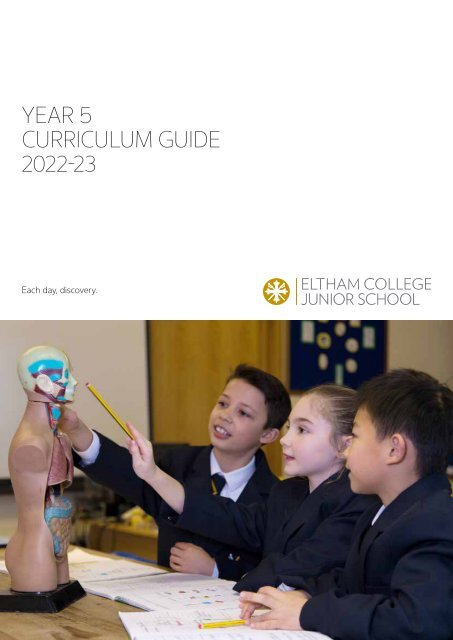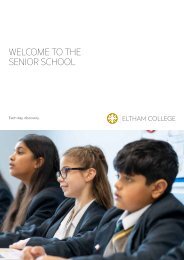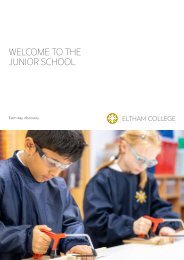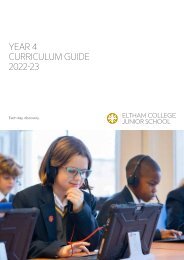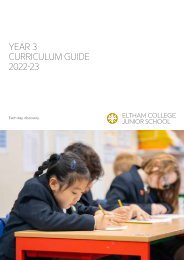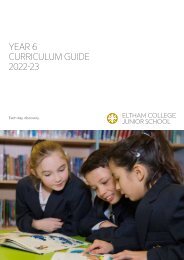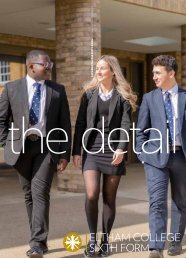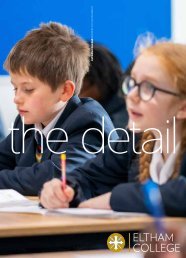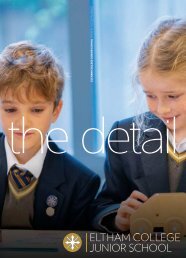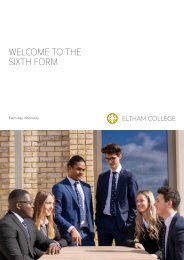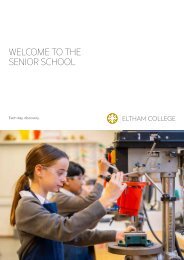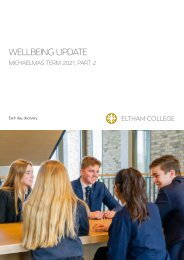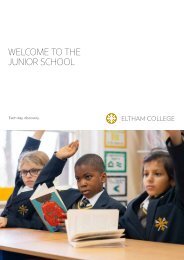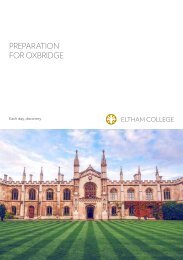JS Curriculum Guide - Year 5 - 2022-23
Create successful ePaper yourself
Turn your PDF publications into a flip-book with our unique Google optimized e-Paper software.
YEAR 5<br />
CURRICULUM GUIDE<br />
<strong>2022</strong>-<strong>23</strong><br />
Each day, discovery.
Each day, discovery.<br />
02<br />
WELCOME<br />
03 04<br />
SUBJECT TEACHERS<br />
HOMEWORK<br />
05<br />
ENGLISH<br />
07<br />
MATHEMATICS<br />
09<br />
SCIENCE<br />
10 11 12<br />
HISTORY<br />
GEOGRAPHY<br />
RELIGIOUS STUDIES<br />
MUSIC<br />
13 14 15<br />
DRAMA<br />
ART AND<br />
DESIGN TECHNOLOGY<br />
FRENCH<br />
MANDARIN<br />
16<br />
COMPUTING<br />
WELLBEING AND PSHE<br />
17<br />
GAMES, SWIMMING,<br />
AND PE<br />
19<br />
LEARNING SUPPORT<br />
20<br />
COMMUNICATION
Each day, discovery<br />
2<br />
Welcome<br />
Dear parents,<br />
Students at Eltham College Junior School follow a broad<br />
curriculum comprising English, Mathematics, Science, History,<br />
Geography, Religious Studies, Music, Drama, Art & Design<br />
Technology, Modern Foreign Languages, Computing, Wellbeing<br />
and PSHE, Physical Education and Games.<br />
We believe that children learn best when they feel secure and<br />
valued, when they are challenged yet supported, when<br />
challenges are closely matched to potential, and when learning is<br />
partnered with enjoyment. As teachers, we seek to instill in our<br />
students a sense of responsibility, a caring attitude, physical,<br />
mental and emotional resilience, and the ability to adapt to a<br />
competitive and changing world.<br />
The education offered at Eltham College Junior School, both<br />
within the classroom and beyond, has the following aims:<br />
• To offer a broad and balanced range of opportunities for<br />
achievement to all students<br />
• To develop logical, critical and imaginative thinking at the<br />
highest level in each student<br />
• To develop effective use of language, both written<br />
and spoken<br />
• To establish sound foundations of numeracy, mathematical,<br />
scientific and technological understanding<br />
• To encourage creativity through active participation in art,<br />
dance, drama and music<br />
• To enable students to enjoy and develop skills in physical<br />
pursuits and competition and to promote healthy living<br />
• To foster concepts of moral responsibility and to awaken<br />
students to the spiritual dimension of life<br />
• To provide opportunities for the growth of leadership, team<br />
spirit, co-operative tolerance and compassion<br />
• To inspire a love of learning for its own sake and to<br />
value scholarship<br />
• To prepare students to take up places at Eltham College by<br />
building upon the foundations of good learning and<br />
well-established work habits.<br />
This booklet, which is a guide only, has been produced to give<br />
you an overview of the curriculum that your child will study this<br />
year. It is subject to change as we adapt and evolve our<br />
curriculum to ensure its continuing suitability.<br />
May I take this opportunity to wish you and your children a happy<br />
and successful year ahead.<br />
Yours sincerely,<br />
Mrs. Nicki Devon<br />
Deputy Head (Academic)
Subject Teachers<br />
SUBJECT TEACHER CLASS<br />
ENGLISH<br />
MATHEMATICS<br />
SCIENCE<br />
Mr Dale<br />
Mrs Wearmouth<br />
Miss Tutchings/Ms Pan<br />
Mr Dale<br />
Mr Wearmouth<br />
Miss Tutchings/Ms Pan<br />
Mr Oliver<br />
Mr Wearmouth<br />
Mrs Goakes<br />
5ND<br />
5IW<br />
5NT<br />
5ND/5IW/5NT<br />
5IW<br />
5ND/5NT<br />
HISTORY Mr Dale 5ND/5IW/5NT<br />
GEOGRAPHY Mr Dale 5ND/5IW/5NT<br />
RELIGIOUS STUDIES Mr Dale 5ND/5IW/5NT<br />
MUSIC Mr Alexander 5ND/5IW/5NT<br />
DRAMA Mr Timbrell 5ND/5IW/5NT<br />
ART & DESIGN TECHNOLOGY Miss Tutchings 5ND/5IW/5NT<br />
FRENCH Mrs Martin 5ND/5IW/5NT<br />
MANDARIN Ms Pan 5ND/5IW/5NT<br />
COMPUTING Ms Pan 5ND/5IW/5NT<br />
WELLBEING & PSHE<br />
PHYSICAL EDUCATION<br />
GAMES<br />
Mr Wearmouth<br />
Miss Tutchings<br />
Mr O’Dwyer<br />
Mr Thomas<br />
+ Senior School Games staff<br />
Mr O’Dwyer<br />
Mr Schaper<br />
Mr Dale<br />
Mrs Martin<br />
Mr Taylor<br />
+ Senior School Games staff<br />
5IW<br />
5NT/5ND<br />
5ND/5IW/5NT<br />
5ND/5IW/5NT<br />
Email contacts for form tutors<br />
Mr Dale<br />
Mr Wearmouth<br />
Miss Tutchings<br />
Ms Pan<br />
nad@eltham-college.org.uk<br />
icw@eltham-college.org.uk<br />
nlt@eltham-college.org.uk<br />
hsp@eltham-college.org.uk<br />
Please contact your child’s specific subject teacher for feedback about that particular subject, rather than the form tutors.<br />
If you need to make changes to pick-up arrangements, please telephone the office rather than emailing, as an email may not be<br />
picked up in time.
Each day, discovery<br />
4<br />
Homework<br />
Students will normally be given at least 2 nights to complete<br />
homework before it is due in. Homework is set either to reinforce<br />
recent learning, to practise a key skill, or to prepare for future<br />
learning. There may be occasions when a teacher’s professional<br />
judgement dictates that a homework task is unnecessary, but the<br />
weekly timetable will largely adhere to the following structure:<br />
English<br />
English homework is set up to twice a week and lasts<br />
approximately 45 minutes; this is in addition to regular reading<br />
and spelling practice.<br />
Mathematics<br />
Mathematics homework is set up to twice a week and lasts<br />
approximately 45 minutes; this is in addition to regular practice<br />
of times tables and number facts.<br />
Science<br />
Science homework is usually set once a week and lasts<br />
approximately 45 minutes.<br />
Where an English, Maths or Science homework has not been set,<br />
teachers may choose to set homework in another curriculum<br />
subject instead, but this will not usually be in addition to core<br />
subject tasks.<br />
All homework tasks and deadlines will be displayed on<br />
elthamcollege.satchelone.com
English<br />
Reading<br />
Developing confident and motivated readers is a core aim of<br />
English teaching at Eltham College Junior School. The staff and<br />
students share a common love of books and there is a real<br />
culture of reading here. The English curriculum is constantly<br />
evolving, building on its rigorous traditional foundations to create<br />
a cohesive, challenging and up-to-date programme of teaching<br />
and learning with great books at its centre.<br />
Though we expect students to be free readers, teachers are on<br />
hand to guide them to the correct choice of books for their level.<br />
We hear students read on a regular basis as part of classroom<br />
activities and we give extra help where possible.<br />
Students should also be reading every evening at home. Regular<br />
reading aloud helps to develop fluency, comprehension and<br />
expression. We ask that parents assist by reading to and with<br />
their children, listening to them reading aloud, and completing<br />
the reading diary appropriately. Students should also be<br />
encouraged to read silently at home for their own enjoyment.<br />
The library is available at lunchtimes and the use of public<br />
libraries is encouraged.<br />
Comprehension will develop through dialogue, as well as more<br />
formal methods, and fortnightly Let’s Think in English lessons.<br />
LTE, already being used successfully in the Senior School, is a<br />
research-based, cognitive acceleration programme developed at<br />
King’s College, London. It is designed to systematically develop<br />
students’ skills of inference, deduction and analysis and by<br />
introducing the programme at Key Stage 2, we will ensure that<br />
students at EC<strong>JS</strong> are best-placed to meet the challenges of the<br />
Senior School English <strong>Curriculum</strong>.<br />
Writing<br />
Whether they have ambitions to be the next J.K.Rowling, to write<br />
speeches for presidents, or to pen prize-winning theses, the<br />
students’ skills with language will play a crucial role in their future<br />
careers. But good writing doesn’t just come out of nowhere.<br />
Writers of all kinds start their training as prolific and voracious<br />
readers and it is from engagement with high-quality texts that the<br />
students will develop their skills.<br />
They will study a wide range of contemporary and classic texts, as<br />
well as non-fiction, poetry and film. Grammar is explicitly taught,<br />
but it is also embedded within the context of the text being<br />
studied, feeding logically and seamlessly into the students’<br />
creative writing.<br />
Creative writing will be taught through the texts being studied, and<br />
students will be encouraged to proofread, edit and revise their own<br />
work and give feedback to their peers. The students will have clear<br />
models to emulate and a strong purpose for their writing, be it<br />
blogging, performance poetry, or a short story competition.<br />
Spelling<br />
A new online spelling scheme, with practice and application at its<br />
centre, has recently been introduced, and the students will begin<br />
to see the benefits of being taught how to apply learned rules to<br />
unfamiliar words. The students are encouraged to learn words<br />
that follow a particular spelling pattern, but their progress will be<br />
assessed with a weekly dictation exercise, testing application<br />
rather than rote learning.<br />
Handwriting<br />
This is taught using the Collins Handwriting Scheme, which<br />
encourages starting all letters from the line. Correct formation of<br />
letters is taught from <strong>Year</strong> 3, and ‘joined-up’ or cursive writing is<br />
expected in <strong>Year</strong>s 4, 5 and 6. Students in <strong>Year</strong> 5 are expected to<br />
use pen for their written work.<br />
Verbal Reasoning<br />
A range of question types and methods is explored weekly.<br />
Presentation of Written Work<br />
From entry to the Junior School students will be instructed how<br />
to present their work in their books.<br />
The following guidelines must be followed;<br />
• All students will write in blue ink pen<br />
• Setting out sheets are glued into the front cover of all<br />
students’ books at the start of the school year, in order for<br />
children to understand how their work should be presented<br />
• The date needs to be written on the left hand side of the<br />
page e.g. Monday 13th March and underlined using blue ink<br />
with a ruler<br />
• We expect no graffiti on exercise books, and a high level of<br />
presentation at all times<br />
The following setting out sheet is used as a guide:<br />
This area at the top of the page is not a space to write<br />
in as it has no top line<br />
Tuesday 5th September<br />
‘Title’ or ‘Unit of Work’<br />
1. Start your work here...<br />
2. Miss a line after each answer
Each day, discovery<br />
6
Mathematics<br />
Teaching Arrangement<br />
As in <strong>Year</strong> 4, students will be taught in sets for Maths during <strong>Year</strong><br />
5. Teaching in sets allows for a smaller group size, and for<br />
learning to be more focused to the particular needs of individuals<br />
or groups of students within a set. The sets will be covering the<br />
same topics from the same scheme of work; it may be, however,<br />
that one set spends slightly more or less time on a certain topic,<br />
or approaches the learning from a more practical or abstract<br />
perspective than others, depending on need.<br />
There is a level of fluidity as to which set students are in, and<br />
changes can be made during the year depending on a range of<br />
factors (not purely scores in assessments). Ability levels do<br />
overlap between sets, especially as different children can have<br />
relative strengths in different topics.<br />
Scheme of Work<br />
Mathematics work this year will continue to primarily use content<br />
from the Pearson “Power Maths” scheme, although we<br />
supplement this with other relevant and engaging resources; we<br />
do not follow the Power Maths workbooks lesson-by-lesson. This<br />
approach will give pupils the chance to develop their conceptual<br />
understanding of topics as well as applying them in<br />
problem-solving and structured practice situations. Students will<br />
be expected to have full and deep confidence in the schemes’<br />
<strong>Year</strong> 5 content, with extension through depth of topic application.<br />
Many topics are covered over the course of the year; below you<br />
will find a summary of topics and expectations.<br />
Calculations<br />
Students will meet, revisit, practise and perfect a range of<br />
calculation methods in all four operations (addition, subtraction,<br />
multiplication and division) over the course of the year. These will<br />
include formal written methods, mental approaches and informal<br />
methods, involving jottings, which support the use of mental<br />
methods over time. The key idea is efficiency - students will be<br />
encouraged to reflect on the numbers involved in a calculation<br />
and choose a method which will lead to the solution efficiently<br />
and securely, rather than always using a certain method<br />
whatever the problem.<br />
Mental Maths and Times Tables<br />
Students will receive regular informal mental maths tests –<br />
designed to identify areas for extra practice and development- as<br />
well as check-ups of times table knowledge. It is expected to have<br />
recall of all times table facts to 12x12 and related division facts by<br />
the end of the year, and students should be increasingly able to<br />
recall square and prime numbers under 100 from memory.<br />
Problem-Solving<br />
Much mathematical content is learned or applied through<br />
problem-solving. As such, students will be given opportunities<br />
to use their ‘problem-solving toolkit’ regularly, involving skills<br />
such as:<br />
talk it through; make a list; try a simpler case; trial and<br />
improvement; draw a diagram; find a rule or pattern; use a<br />
system; act it out.<br />
Explicit reference to these strategies within lessons will give<br />
students confidence to identify and use them in their own<br />
independent problem-solving. Students should be learning<br />
to explain and prove mathematical patterns using<br />
appropriate language..
Each day, discovery<br />
8<br />
STRAND<br />
Number & Place Value<br />
Mental Addition<br />
& Subtraction<br />
Written Addition<br />
& Subtraction<br />
Mental Multiplication<br />
& Division<br />
Written Multiplication<br />
& Division<br />
Fractions<br />
Measurement<br />
Geometry<br />
Statistics<br />
KEY OBJECTIVES FOR YEAR 4 END<br />
Read, write and order whole numbers with up to six digits and decimal numbers with three decimal<br />
places; identify the place value of each digit.<br />
Round whole numbers to powers of 10 up to 1,000,000; round decimal numbers to the nearest tenth<br />
and whole number.<br />
Understand negative numbers; count forwards and backwards between positive and negative whole<br />
numbers to solve problems.<br />
Solve place value calculations mentally, e.g. 320,070 + 8,008.<br />
Choose a strategy for solving mental additions or subtractions, including 1-step and 2-step word<br />
problems; explain strategies clearly.<br />
Add decimal numbers mentally.<br />
Use counting up as a strategy for mental subtraction where appropriate, including subtracting<br />
decimal numbers with different numbers of places.<br />
Solve missing number problems using inverse operations.<br />
Use column addition and subtraction to add and subtract 5-digit numbers, decimal numbers in<br />
context (e.g. money), and numbers with differing amounts of digits.<br />
Develop skills for checking, including using estimation and inverses.<br />
Use mental multiplication strategies to multiply by numbers such as 4, 8, 5, 25, 19, 29 and 99.<br />
Use partitioning to mentally multiply 2-digit numbers with one decimal place by whole 1-digit numbers.<br />
Multiply and divide by 10, 100 and 1000.<br />
Begin to identify common factors of two numbers; understand and use the vocabulary of prime<br />
numbers, and find prime numbers less than 100.<br />
Understand that multiplication and division are inverse operations. Recognise and use square and<br />
cube numbers.<br />
Use short multiplication to multiply 4-digit numbers, including those with two decimal places, by<br />
1-digit numbers.<br />
Use long multiplication to multiply numbers up to 4 digits by a 2-digit number.<br />
Use short division to divide 3- and 4-digit numbers by 1-digit numbers, including those which leave a<br />
remainder; express a remainder as a fraction, simplifying where possible.<br />
Solve word problems involving multiplication and division, including two-step problems.<br />
Use inverses and estimation to check answers to calculations. Solve problems involving scaling, using<br />
appropriate strategies.<br />
Convert decimals (up to two places) to fractions and vice-versa; begin to represent and use thousandths.<br />
Compare and order fractions with different, but related, denominators.<br />
Add and subtract fractions with different, but related, denominators. Convert between improper<br />
fractions and mixed numbers.<br />
Multiply proper fractions and mixed numbers by whole numbers.<br />
Know and apply key equivalences between percentages and fractions; use effective strategies to find<br />
percentages of amounts, including money.<br />
Solve problems involving equivalence and conversion between fractions, decimals and percentages.<br />
Revise accurate measurement in a range of metric measures.<br />
Convert between measures; use approximate equivalence between metric and common imperial units.<br />
Revise reading the 24-hour clock and convert 12-hour times to<br />
24-hour; solve problems involving time intervals using the 24-hour clock.<br />
Understand perimeter, area and volume; measure and calculate the area and perimeter of rectilinear<br />
shapes.<br />
Revise properties and classification of 2D shapes, accurately drawing 2D shapes using a ruler,<br />
protractor and compasses.<br />
Estimate and compare the size of angles; use properties of shapes to find missing lengths and angles.<br />
Name and describe properties of 3D shapes; systematically find and compare nets for different 3D shapes.<br />
Read and plot co-ordinates; draw and translate simple polygons using coordinates and find missing<br />
co-ordinates for a vertex on a polygon; draw and reflect simple polygons in a co-ordinate grid.<br />
Revise reading and interpreting different types of data display, including timetables.<br />
Solve problems relating to line graphs; consider which data is best shown in this way.
Science<br />
We have devised our own exceptional scheme of work for<br />
Science, which provides excellent coverage of the National<br />
<strong>Curriculum</strong> as well as incorporating additional strands. The<br />
students learn about a wide range of living things, materials<br />
and physical<br />
phenomena. They make links between ideas and explain things<br />
using simple models and theories.<br />
They apply their knowledge and understanding of scientific ideas<br />
to familiar phenomena, everyday things and their personal<br />
health. They think about the effects of scientific and<br />
technological developments on the environment and other<br />
contexts. They carry out more systematic investigations, working<br />
on their own and with others.<br />
The students use a range of reference sources in their work. They<br />
talk about their work and its significance, using a wide range of<br />
scientific language, conventional diagrams, charts, graphs and IT<br />
to communicate their ideas.<br />
Science work in the Junior School is focused on experiment,<br />
investigation and practical observation. Our scheme of work<br />
provides students with a clear knowledge and skills focus.<br />
Programme of Study<br />
Topic 1: Space<br />
• Solar system<br />
• Day and year length<br />
• Using the Sun to measure time<br />
• Seasons<br />
• Phases of the moon<br />
Topic 2: Hot and Cold<br />
• Comparing and grouping materials<br />
• Using materials for a certain purpose<br />
Topic 3: Reactions<br />
• Properties of solids and liquids<br />
• Comparing metals<br />
• Comparing plastics<br />
• Testing materials<br />
• Separating mixtures<br />
• Dissolving<br />
• Filtration<br />
• Purifying water<br />
Topic 4: Forces<br />
• Measuring forces<br />
• Gravity<br />
• Parachutes<br />
• Floating and sinking<br />
• Stretching materials<br />
Topic 5: Life Cycles and Living Things<br />
• Life cycle of mammal, insect, amphibian and birds<br />
• How humans can help endangered animals complete<br />
their lifecycle<br />
• Animal migrations to complete their life cycle<br />
• Flower parts for reproduction<br />
• The life cycle of flowering plants<br />
• Animal reproduction<br />
• Human growth and development
Each day, discovery<br />
10<br />
History<br />
During Key Stage 2, students learn about significant people,<br />
events and places from both the recent and more distant past.<br />
They learn about change and continuity in their own area, in<br />
Britain and in other parts of the world. They look at history in a<br />
variety of ways, for example from political, economic,<br />
technological and scientific, social, religious, cultural or<br />
aesthetic perspectives.<br />
They use different sources of information to help them investigate<br />
the past both in depth and in overview, using dates and historical<br />
vocabulary to describe events, people and developments. They<br />
also learn that the past can be represented and interpreted in<br />
different ways.<br />
Autumn Term<br />
• The Tudors<br />
Spring Term<br />
• Exploration of the New World<br />
Summer Term<br />
• The Stuarts<br />
Drama workshops and visits to relevant places are arranged each<br />
term. The students will also be able to experience a range of<br />
hands-on workshops that take place in school. There will<br />
sometimes be the option to dress up for these workshops, which<br />
is encouraged but not compulsory.
Geography<br />
The students will investigate a variety of people, places and<br />
environments at different scales in the United Kingdom and<br />
abroad and start to make links between different places in the<br />
world. They find out how people affect the environment and how<br />
they are affected by it.<br />
They carry out geographical enquiry inside and outside the<br />
classroom. In doing this they ask geographical questions, and<br />
use geographical skills and resources such as maps, atlases,<br />
aerial photographs and ICT.<br />
Autumn Term - Europe<br />
• Labelling European countries and capital cities<br />
• Ways to travel to Europe<br />
• Population and tourism/economic groups and<br />
wealth/trade/EU<br />
• Focus on Russia<br />
Spring Term - Rainforests study<br />
• Looking particularly at the rainforests of South America and<br />
endangered species.<br />
• Study the location, climate, people, Amazon Rainforest,<br />
pollution, deforestation and the greenhouse effect.<br />
• Skills – using the atlas to find out information about the<br />
environment and population..<br />
Summer Term - Coastal formations (Following on from<br />
residential trip to Norfolk)<br />
• Erosion and deposition<br />
• Habitats<br />
• Protection<br />
Religious Studies<br />
Students learn about the major world religions, recognising the<br />
impact of religion and belief locally, nationally and globally. They<br />
make connections between differing aspects of religion and<br />
consider the different forms of religious expression. Students<br />
consider the beliefs, teachings, practices and ways of life central<br />
to religion. They learn about sacred texts and other sources and<br />
consider their meanings.<br />
Students learn about similarities and differences both within and<br />
between religions and beliefs and the importance of dialogue<br />
between them. They extend the range and use of specialist<br />
vocabulary and have the opportunity to communicate their<br />
ideas, recognising other people’s viewpoints. They consider their<br />
own beliefs, values, and those of others in the light of their<br />
learning in religious education.<br />
Our assemblies deal with many issues, often through weekly<br />
themes. Students also have the chance to debate and discuss<br />
topical and relevant issues thus allowing them to think critically<br />
and form opinions.<br />
We also study:<br />
Autumn Term<br />
• Pilgrimage and creation stories<br />
Spring Term<br />
• Ethical queries and questions<br />
Summer Term<br />
• Ethical study of the environment<br />
• Ethics in the media
Each day, discovery<br />
12<br />
Music<br />
In Music, classwork will reinforce the skills of performance,<br />
composition, listening and appraising. These elements will be<br />
taught through songs and practical activities, helping students<br />
to consolidate and develop their knowledge of the key<br />
musical concepts.<br />
Students have the opportunity to perform pieces which they<br />
have studied in their individual lessons at any time to the form.<br />
They will have regular singing sessions. In these, students will<br />
extend their repertoire of assembly songs and hymns as well as<br />
learning a selection of light-hearted songs. They will develop<br />
their understanding of how the voice is produced and managed<br />
through a series of vocal activities.<br />
All <strong>Year</strong> 5 Students are invited to join <strong>Year</strong> 5 and 6 Choir and<br />
some will be invited to join appropriate Chamber Ensembles by<br />
Heads of Sections.<br />
Scheme of Work<br />
Autumn Term<br />
• Melodic Shape in compositions<br />
• Smetana’s Ma Vlast is looked at in detail<br />
• Prokofiev’s Dance of the Knights from Romeo and Juliet is<br />
looked at in detail<br />
• Preparation for Christmas services and concerts<br />
Spring Term<br />
• Preparation for Inter-House Music Competition<br />
• Opera and themes common to this genre<br />
• Britten’s Peter Grimes is studied in detail<br />
Summer Term<br />
• World Music – examples which highlight a range of music<br />
from across the globe are compared<br />
• Introduction to Music Technology and composition using<br />
MusicFirst software<br />
• Preparations for Summer Concert
Drama<br />
Throughout their time at Eltham College Junior School students<br />
will learn the key elements of Drama including Storytelling,<br />
Devising, Improvisation, Stanislavski and The System, Method<br />
Acting, Actioning and Playwriting. This will allow them to develop<br />
a range of skills within the ‘Core Learning Outcomes’ of Drama;<br />
Performance, Creativity and Reflection. They will explore a wide<br />
range of characters, texts and techniques whilst gaining<br />
confidence and developing their performance skills.<br />
The bespoke curriculum will lay the foundations for Drama as a<br />
subject, which will set them up with the tools and experience<br />
needed to pursue Drama in the Senior School and beyond. They<br />
will have regular opportunities to use these skills while working<br />
towards performances. Lessons will be highly interactive, physical<br />
and collaborative. Lessons will also incorporate elements of the<br />
pupils’ study in other areas of the curriculum. Productions will<br />
happen for each year group once a year and will give each pupil the<br />
opportunity to experience a production process and live<br />
performance. Productions will include Shakespeare, Chaucer in<br />
Performance, Dr Seuss in Performance and Poetry in Performance.<br />
Scheme of Work<br />
Autumn Term<br />
• Devising<br />
• Commedia Del-Arte and Melodrama<br />
Spring Term<br />
• Shakespeare in Performance<br />
• <strong>Year</strong> 5 Production: Shakespeare Stories<br />
Summer Term<br />
• Duologues: Textual Analysis in Performance<br />
• Monologues: Writing and Performing
Each day, discovery<br />
14<br />
Art and<br />
Design Technology<br />
We spend half a term on design technology projects and half a<br />
term on Art during the weekly timetabled lessons. This allows<br />
students time to develop their projects in greater depth. Whilst<br />
there is an overlap between Art and Design Technology, DT<br />
focuses on the design and making process of a product with a<br />
use or purpose and Art focuses on creating and responding to<br />
stimulus and developing creative skills.<br />
Art<br />
In Art lessons, students develop their creativity and imagination<br />
by experimenting, inventing and creating their own varied works<br />
of art using a range of materials They will learn how to draw,<br />
paint, sculpt and explore other art, craft and design techniques.<br />
Students are introduced to a wide range of media including<br />
paint, pastels, clay, collage, printing and textiles. They also have<br />
the opportunity to discover the work of great artists from<br />
different cultures and use their work as inspiration for their own<br />
pieces. They will have the chance to participate in a workshop<br />
day led by an artist.<br />
Students create sketch books to record their learning and explore<br />
ideas and themes.<br />
Scheme of Work<br />
The scheme of work for this academic year is focused on the<br />
inspiration of artists from different eras and using different styles<br />
of art.<br />
<strong>Year</strong> 5 Projects<br />
• Van Gogh<br />
• Kandinsky<br />
• Hokusai<br />
• Artist’s workshop<br />
Design Technology<br />
We spend half a term on Design Technology projects and half a term<br />
on Art. This allows the students to develop their projects in greater<br />
depth. Students work on their own and part of a team on a range of<br />
designing and making activities. They think about what the products<br />
are used for and the needs of the people who use them.<br />
They plan what has to be done and identify what works well and<br />
what could be improved in their own and other people’s designs.<br />
They draw on knowledge and understanding from other areas of the<br />
curriculum and use computers in a range of ways.<br />
This year, the students build upon their knowledge of the design<br />
process and use each stage of it to support their ideas for solutions<br />
to everyday problems. The students also learn how to record and<br />
annotate elevations so that they are able to be used as a blueprint.<br />
This year our projects will be based around the following areas:<br />
Mechanical Systems<br />
• Students will create a product that helps them to understand<br />
how movement can be created from different systems.<br />
Food and Nutrition<br />
• Students will learn where various types of foods come from<br />
and to understand that seasons may affect food availability.<br />
To prepare food in a safe and hygienic way.<br />
Electrical Systems<br />
• Students will design and make a product which can move<br />
using an electrical circuit.
French<br />
In <strong>Year</strong> 5, students will expand their knowledge of French<br />
language and culture through a variety of activities. They will<br />
revisit familiar topics in order to refresh their repertoire from <strong>Year</strong><br />
4 and then extend and develop their awareness of grammar and<br />
vocabulary via new contexts.<br />
Topics include:<br />
• Numbers up to 100<br />
• The time<br />
• Myself and Family<br />
• Body parts<br />
• Physical descriptions<br />
• Weather and Seasons<br />
• Festivals and Celebrations<br />
Via these topics, they will reinforce their knowledge of French<br />
phonics and develop grammatical structures such as gender,<br />
adjectival agreements and pronouns. Language games and<br />
song are used to enthuse students and develop the skills<br />
necessary for effective language learning.<br />
Strong emphasis is placed on listening and speaking during<br />
lessons, while writing is gradually introduced during class time.<br />
Learning technology is integrated throughout the curriculum to<br />
support and contextualise learning.<br />
Mandarin<br />
In <strong>Year</strong> 5, students have one Mandarin lesson of 40 minutes per<br />
week. During the first term, students will have a taste of this<br />
language through a variety of linguistic and cultural activities.<br />
They will be exposed to the key elements of Mandarin language<br />
including pinyin (spelling with tones) and basic characters writing.<br />
They will then explore the curriculum topics as listed below in<br />
more depth throughout the course of the year. Their language<br />
knowledge and four skills (speaking, listening, reading and<br />
writing) will continue to be enhanced by exploring the Chinese<br />
language and culture through a range of project-based activities,<br />
culture related lifestyle, events and festivals, and comparing it to<br />
their home countries.<br />
The students are encouraged to start working on accurate<br />
pronunciation and intonation, be familiar with character writing<br />
system and basic grammar rules. Songs, short stories, role plays,<br />
arts and crafts, games, videos and ICT based tasks related to<br />
their age and level will be integrated into the lesson activities.<br />
Students will also have access to a few language learning<br />
platforms. They have included individualised learning programme<br />
(based on individual language level), matching activities and<br />
games to support each learner’s Mandarin learning journey.<br />
Specific topics to be explored will be:<br />
• Basic greeting and classroom instructions<br />
• Introduce myself and my family<br />
• Numbers and age<br />
• Zodiac animals and Chinese festivals<br />
• Colours and body parts<br />
• My favourite hobby
Each day, discovery<br />
16<br />
Computing<br />
In <strong>Year</strong> 5 we develop the following skills and knowledge:<br />
General Technological Awareness<br />
• To be able to use a range of devices independently<br />
• To be able to quickly navigate between different programs<br />
in Windows<br />
• To confidently link hardware, via USB cables or bluetooth,<br />
with devices<br />
Programming<br />
• To consolidate their understanding of how to program using<br />
blocks of code in Scratch<br />
• To be able to solve problems through decomposition<br />
• To use more complex variables and store data within them<br />
for reuse<br />
• To read and amend flowchart algorithms<br />
• To use coordinates<br />
• To use inputs and broadcasts<br />
• To independently plan and code their own game<br />
• To be able to debug complex code<br />
• To apply their knowledge of Scratch to other programming<br />
languages e.g. MakeCode<br />
• To explore physical computing using the micro:bit<br />
Internet Safety<br />
• To continue to understand how to stay safe as they become<br />
independent internet users<br />
• To understand the risks associated with accepting files online<br />
• To know how to tell whether online information is reliable<br />
Digital Literacy<br />
• To be able to confidently use the Microsoft Office Suite of<br />
programs and apply this knowledge to other apps and<br />
online resources<br />
• To be developing their touch typing skills<br />
• To be able to save on OneDrive in Office 365 and<br />
share documents<br />
• To be able to use the Sway (presentation) application<br />
in Office 365<br />
Understanding Technology<br />
• To understand the importance of technology<br />
• To understand how computing skills can be used in the<br />
world of work<br />
• To explore how search engines work<br />
• To consolidate their computational thinking skills<br />
including abstraction<br />
Wellbeing and PSHE<br />
Wellbeing & PSHE (Personal, Social and Health Education) is a<br />
subject through which students develop an awareness of physical,<br />
social, emotional and sexual health. We try to provide students with<br />
knowledge and promote the development of skills they need to<br />
create a balanced lifestyle.<br />
Much of this work occurs through other subjects and is therefore<br />
cross-curricular. We deal with issues as diverse as ‘personal safety’<br />
and ‘Staying Healthy’. There will also be opportunities to discuss<br />
relevant current affairs and issues that affect the class.<br />
Sometimes issues arise through our daily interaction in school.<br />
These may also be dealt with in assembly as well as in the classroom.<br />
The following topics will be looked at in PSHE:<br />
• Me and My Relationship (includes feelings, emotions,<br />
conflict resolution and friendships)<br />
• Valuing Difference (includes British Values focus)<br />
• Keeping Myself Safe (Includes aspects of safe internet use,<br />
drugs and Relationships Education)<br />
• Rights and Responsibilities (includes money, living in the<br />
wider world and the environment)<br />
• Being My Best (includes keeping healthy, growth mindset,<br />
goal setting and achievement)<br />
• Growing and Changing (includes RSE related issues)<br />
During the year, our School Nurses, Annie Brooke and Catherine<br />
Baker, will be taking the students for sex education lessons<br />
which will cover puberty, conception, pregnancy and birth.
Games, Swimming,<br />
and PE<br />
The sports studied in Games lessons are:<br />
Autumn Term<br />
Netball<br />
• Girls in <strong>Year</strong> 5 will play netball following the England Netball<br />
Scheme Bee Netball.<br />
• Bee Netball enables children to play netball and develop<br />
other key skills such as friendship, inclusion and fair play.<br />
Skills taught in Netball include:<br />
• Passing and receiving the ball.<br />
• Reinforcement of the various player roles and building on<br />
the rules of the game introduced in <strong>Year</strong> 4.<br />
Rugby<br />
• Boys in <strong>Year</strong> 5 will play tag rugby as per the new<br />
continuum rules.<br />
• Team sizes have been reduced as per the RFU requirements<br />
to a maximum of 8 a side.<br />
• Boys are not assigned positions to enable them to<br />
experience a broad range of skills.<br />
Skills taught in Rugby include:<br />
• Passing, receiving, off-loading (from feet and from ground.)<br />
• Tackling (side, front and rear.)<br />
• Evasive running skills, lines of running, support lines.<br />
• Breakdown skills.<br />
Spring Term<br />
Football is taught this term.<br />
Skills taught in Football are:<br />
• Passing (inside and outside of foot, along the floor, in the air.)<br />
• First Touch<br />
• Shooting<br />
• Positional Understanding<br />
• Tackling<br />
• Ball distribution and match play.<br />
Summer Term<br />
Cricket is taught this term.<br />
Lessons are divided between net sessions where there is specific<br />
focus on battling and bowling and sessions on the square where<br />
match play, field positions and fielding techniques are taught.<br />
Skills taught in Cricket are:<br />
• Bowling (focus on accurate technique aiming to produce a<br />
consistent action.)<br />
• Batting (correct grip, stance and footwork, calling, backing up)<br />
• Throwing (underarm and overarm.)<br />
• Fielding skills (long barrier, backing up, etc)<br />
• Fielding positions and match play<br />
PE Swim<br />
The PE Swim programme for the Autumn and Spring terms has<br />
been revamped for this year with pupils taught in their forms<br />
rather than in their swim ability groups as they were last year.<br />
Details of the plan has been mailed round to parents.<br />
Summer Term<br />
In the summer term the students are taught and their scores<br />
recorded in a number of athletic activities including, short-,<br />
middle- and long-distance running, long jump and turbo javelin.<br />
• Beginner tennis players (those who do not receive coaching<br />
outside of school) will also have the opportunity to sign up<br />
for coaching sessions with an outside coach during PE<br />
lessons in the summer term. Details of this will be sent to<br />
you in the spring term via the school office.<br />
• There are also a wide variety of co-curricular activities that<br />
you may enroll your child in. A list of clubs is available from<br />
the school office.
Each day, discovery<br />
18<br />
Team Selection<br />
The Junior School plays competitive fixtures against local schools<br />
in the major school sports (rugby, football, cricket and hockey) and<br />
in a selection of minor sports as well (tennis and swimming.)<br />
Over recent years an effort has been made to extend our fixture<br />
card in the major sports by increasing the number of teams<br />
participating in fixtures which in turn increases the opportunities<br />
for students to represent the school.<br />
At the start of each term, the students are placed into mixed ability<br />
groups to enable all students to be assessed by the members of<br />
staff responsible for running the teams in each year group.<br />
Students that have played for a particular team in a previous year<br />
are not guaranteed a place in that team the following year. All<br />
students are assessed on where they are at that point in time and<br />
not based upon historically which team they have represented.<br />
This enables all students to feel that the selection process is<br />
open and transparent, and that team selection is not automatic<br />
from one year to the next.<br />
If a student is not selected for a team that they have represented<br />
the previous year, the teacher responsible for the coaching of<br />
that team will endeavour to provide constructive feedback to the<br />
student in question to enable them to further develop their skills<br />
so that they understand what aspects they need to focus on.<br />
Throughout the term there is scope for students to move between<br />
groups. Members of staff meet regularly to discuss the progress of<br />
individuals in their group and discuss their merits and progress.<br />
Please ensure that all of your child’s equipment is named – sewn<br />
name tags are better than pen (which washes off!). Loops are<br />
needed on cagoules – as they are hung on pegs. Remember<br />
that new clothing or footwear needs to be named too. Please<br />
keep an eye open for other people’s property that may appear<br />
with your child’s laundry!
Learning Support<br />
The aim of the Learning Support provision within Eltham College<br />
Junior School is to identify and support students with specific<br />
learning difficulties through a whole school approach, whilst<br />
working in partnership with parents and any other relevant<br />
outside agencies. ALL teachers are teachers of children with<br />
specific learning difficulties.<br />
Specific Learning difficulty<br />
identification procedure<br />
Children may require learning support either throughout or at<br />
any time during their career at the Junior School. We aim to<br />
provide targeted support to those with identified needs who join<br />
the Junior School and investigate and support those whose<br />
needs are identified whilst they are at the school.<br />
The process is as follows:<br />
Identification from a previous school<br />
A Student may have an EHCP, an EP report, be in the process of<br />
being assessed by an external body or have other relevant<br />
reports. Once a pupil has received a diagnosis a pupil passport<br />
including targets will be written, in consultation with the form<br />
tutor and parents. Targets will be updated on a termly basis or<br />
more frequently if necessary.<br />
Identification at any other stage<br />
A concern may be identified by a form tutor/subject teacher or<br />
parents at any time. The Head of Learning Support will carry out a<br />
computerised screening programme, primarily to identify Dyslexia<br />
as well as conduct classroom observations. This screening can take<br />
place at any point within the school year. Parents will be notified of<br />
the results, a meeting will be arranged to discuss the findings and<br />
the child will be monitored and supported within class. If no<br />
evidence of a special educational need is found, the student will be<br />
kept under close observation by the form tutor. At this stage, they<br />
may also begin on a short booster programme in English or Maths.<br />
If evidence of a learning difficulty is found, a further meeting will be<br />
held with parents, and the student will be referred to an EP or other<br />
professional for formal assessment. A pupil passport will then be<br />
written and support will be offered in line with the<br />
recommendations made.<br />
Targets will be reviewed on a termly basis by the Head of Learning<br />
Support and the Learning Support Assistant, and the student, the<br />
LSA and Head of Learning Support will meet annually with parents<br />
to review these plans, or more frequently depending on the<br />
changing needs of the individual.<br />
Medical Needs<br />
Some students may have specific medical conditions, which may<br />
impact on their learning. In these cases, a medical care plan will<br />
be formulated by the school nurse and a student profile<br />
formulated by the Head of Learning Support. There will be<br />
collaboration between the nurse, Head of Learning Support, LSA<br />
and the parents to ensure the best provision for the student.
Each day, discovery<br />
20<br />
Communication<br />
At Eltham College we would like both students and parents<br />
to feel part of, and know what is taking place within, our<br />
community. General information can be found on our website<br />
www.elthamcollege.london<br />
You can access information specific to Eltham College parents by<br />
visiting www.elthamcollege.london/parents where you can also<br />
find links to the secure Parent Portal and ElthamPost.<br />
The Parent Portal will allow you to see reports and grades, as well<br />
as receive notifications for merits and detentions. ElthamPost is<br />
our communication portal, with copies of emails sent to you from<br />
the College. To access both of these portals, you should register<br />
with the Parent Portal; please contact the School Office if you<br />
have not received instructions for this.<br />
You can also contact the College by post, telephone and email:<br />
Eltham College Junior School<br />
Mottingham Lane Mottingham<br />
London<br />
SE9 4RW<br />
+44 (0)20 8857 3457<br />
juniors@eltham-college.org.uk<br />
The College also uses various social media accounts to inform<br />
our community about news, events and achievements.<br />
@ElthamJuniors<br />
@ElthamCollegeUK<br />
@ElthamHead<br />
@ElthamSport<br />
@ElthamMusic<br />
@ElthamCollLib<br />
@ElthamCareers<br />
ElthamCollege<br />
ElthamCollegeUK<br />
Some departments have curriculum specific Twitter accounts<br />
which the teacher will inform you of in class.
Gloria Filiorum Patres<br />
Eltham College Junior School<br />
Mottingham Lane<br />
Mottingham, London SE9 4RW<br />
+44 (0)20 8857 3457<br />
juniors@eltham-college.org.uk<br />
09/22<br />
www.elthamcollege.london


